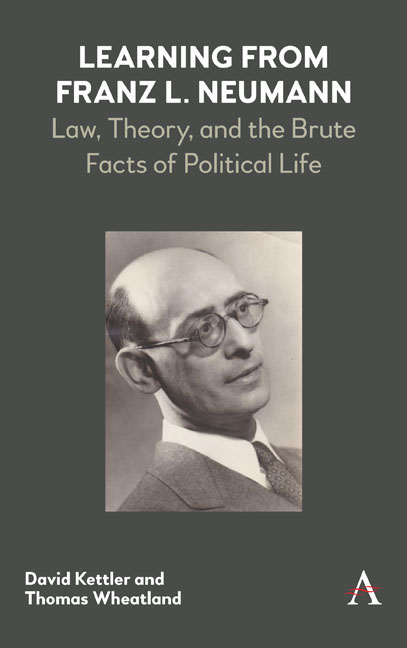Book contents
- Frontmatter
- Contents
- Chapter 1 The Challenge of Franz L. Neumann
- Chapter 2 Social Constitution, Social Power and Responsibility: Neumann and Labor Advocacy
- Chapter 3 Power, Resistance and Constitutions
- Chapter 4 Franz Neumann's Commemoration of Exile
- Chapter 5 After Weimar: The First Exile
- Chapter 6 Neumann's Second Exile: Negotiating the Politics of Research
- Chapter 7 No Happy End: Unprofitable Negotiations
- Chapter 8 Behemoth: Wars Can Be Lost
- Chapter 9 Franz Neumann in Washington: The Political Intellectual at War
- Chapter 10 Franz Neumann in the University: La guerre est finie
- Chapter 11 The Legacy: Four Studies
- Conclusion
- Index
Chapter 1 - The Challenge of Franz L. Neumann
Published online by Cambridge University Press: 06 September 2019
- Frontmatter
- Contents
- Chapter 1 The Challenge of Franz L. Neumann
- Chapter 2 Social Constitution, Social Power and Responsibility: Neumann and Labor Advocacy
- Chapter 3 Power, Resistance and Constitutions
- Chapter 4 Franz Neumann's Commemoration of Exile
- Chapter 5 After Weimar: The First Exile
- Chapter 6 Neumann's Second Exile: Negotiating the Politics of Research
- Chapter 7 No Happy End: Unprofitable Negotiations
- Chapter 8 Behemoth: Wars Can Be Lost
- Chapter 9 Franz Neumann in Washington: The Political Intellectual at War
- Chapter 10 Franz Neumann in the University: La guerre est finie
- Chapter 11 The Legacy: Four Studies
- Conclusion
- Index
Summary
Franz L. Neumann was a twentieth- century political thinker compelled to address central issues of democratic political understanding that have unexpectedly returned to prominence in recent years. Above all, there are patterns of threat to the convergence of pluralist social formations and adaptive constitutional orders that appeared securely established in the predominant array of states, notably the rise of authoritarian political leaders able to secure recognition from constituencies comprised of disillusioned publics and interested centers of power. It is understandable, then, that some attention has turned to the generation of thinkers that encountered fascist rule in its various embodiments in the twentieth century, especially the classical— and worst— instance of National Socialist rule in Germany, notable among other examples of the time in that it displaced a troubled but working democracy. Much of the discussion of those cases segued into a more inclusive examination of “totalitarianism,” designed to comprehend the Soviet state as well, which shifted attention from key issues of democratic theory, notably the use of such key democratic institutions as universal suffrage to destroy democracy. Yet, that is precisely the form taken by present- day threats.
That class of questions could not be neglected by the generation of political exiles who had played an active role in the struggles of Weimar, among whom Franz Neumann was certainly the best recognized, notably after the publication of Behemoth during the course of the Second World War. Although he was never a Marxist in his political theory of the democratic state, his recourse to social analyses he learned from Marxists made it easy to put him aside in the postwar years, especially in view of his silencing by an early death. Alternatively, he could be referred to the rather amorphous entity called the “Frankfurt School,” in the light of his years of employment in Max Horkheimer's New York Institute, and then dismissed as a lesser thinker by the scholars focused on this tendency precisely because he insisted on a political and social frame of analysis centered on issues of power and law. He certainly learned from his dealings with the Institute, but he worked as an independent scholar, as well as contributing important effort to collective ventures, as mandated by his position as a senior- level research associate. Behemoth, in fact, was expressly written outside of the terms of reference and discipline of the Institute.
Information
- Type
- Chapter
- Information
- Learning from Franz L. NeumannLaw, Theory, and the Brute Facts of Political Life, pp. 1 - 8Publisher: Anthem PressPrint publication year: 2019
